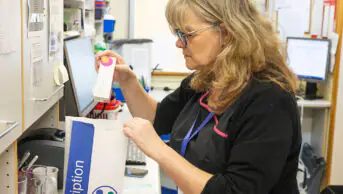
Shutterstock.com
Community pharmacies provided almost 38 million unpaid consultations over a year that otherwise would have resulted in patients visiting their GP, an audit of advice given in pharmacies has found.
Published on 29 October 2024, the Community Pharmacy England (CPE) 2024 Pharmacy Advice Audit found that 61,837 unpaid consultations were completed in one day across 3,916 community pharmacies when the audit was carried out in the summer of 2024.
Unpaid consultations are those that fall outside of an NHS-commissioned service, meaning the pharmacist is not remunerated for their time.
Of the consultations recorded, 80.8% (49,964) were self-referrals, with 19.2% (11,873) taking place because patients were unable to access the part of the health system they initially required, or being informally referred outside of the Pharmacy First service.
Of these referrals, 8.2% (5,100) were informally referred by general practice, and 2.9% (1,796) were informal referrals from NHS 111.
Some 56.8% (35,129) of the consultations were initiated with a non-pharmacist, while 43.2% (26,708) were started with the pharmacist. Of the consultations begun with the non-pharmacist, 25.1% (8,830) were referred to the pharmacist, meaning that there were a total of 35,538 consultations involving the pharmacist.
Of the patients who visited a pharmacy for advice, 54.6% (33,781) said they would otherwise have contacted their GP, saving 725,162 GP surgery appointments per week, or almost 38 million in total over the year.
In evidence given to the All Party Parliamentary Group on Pharmacy inquiry into the future of pharmacy services following the COVID-19 pandemic in 2021, the then Pharmaceutical Services Negotiating Committee (now CPE) estimated that 40 million GP appointments could be covered in pharmacies under the then-existent Community Pharmacist Consultation Service (CPCS).
The evidence said: “We estimate that the cost to provide 40 million minor ailments GP appointments per year is £1.2bn, but the cost to transfer these to pharmacies as CPCS minor ailments consultations would only be £560m, resulting in a 53% cost reduction.”
The 2024 CPE advice audit is the fourth that the organisation has carried out, and the first since the introduction of the Pharmacy First scheme in England, which began on 31 January 2024.
NHS Business Services Authority data show that between the beginning of February 2024 and June 2024 (the most recent figures available), community pharmacies made claims for more than 750,000 consultations across the seven conditions it covers.
Additionally, NHS England has set a target for 320,000 Pharmacy First consultations to be carried out each month by March 2025.
Commenting on the audit data, Janet Morrison, chief executive of CPE, said: “This walk-in healthcare advice has never been more important as the public struggles to access many parts of the health service: and it’s no surprise that our data shows that more and more people are relying on it.
“Unfortunately, much of this professional advice is simply not being paid for by the NHS. Community pharmacies are under intense financial, operational and other pressures — leading to thousands of pharmacy closures in recent years — and they simply cannot continue to do work for free.”
Paul Rees, chief executive of the National Pharmacy Association, said: “As this data shows, it’s clear the workload of an average pharmacy has drastically increased whilst funding has been reduced significantly.
“This is simply not sustainable and is pushing pharmacies to the brink, with a record number shutting and many more having to reduce the services they offer as a result.”
Rees added: “Pharmacies want to provide the best possible care to their patients and take pressure away from other parts of our overstretched system. However, they cannot do this without a long-term funding increase and a new deal that will halt the closures and allow pharmacies to expand the care they can offer their communities.”
In a written parliamentary answer, published on 24 October 2024, Stephen Kinnock, pharmacy minister, said: “The consultation with Community Pharmacy England on the national funding and contractual framework arrangements [for 2024/25] has not yet been concluded.”


